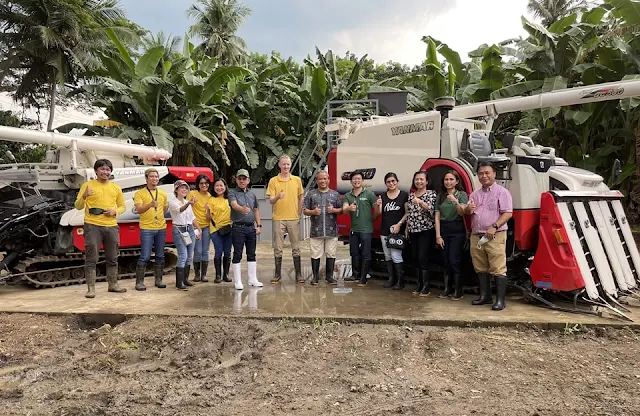by Nimfa Estrellado September 24, 2022 CEO of Straw Innovations Ltd. Mr. Craig Jamieson (middle) welcomed and toured the SEARCA team headed...
September 24, 2022
LOS BAÑOS, Laguna - The Southeast Asian Regional Center for Graduate Study and Research in Agriculture (SEARCA) in Los Baños and organizations based in the United Kingdom will soon provide clean energy in rural areas using rice straw to make clean energy accessible to remote and underserved rural communities.
Mr. Craig Jamieson, Director and Founder of Straw Innovations, explains that the hub can save 300 million tonnes of rice straw from being burned as waste across Asia each year with “exciting potential to bring clean energy access to the 150 million small-scale rice farmers who need it to process their crops and generate new income opportunities.”
“The project team will also test a biogas engine for combined heat-and-pumping,” Jamieson said.
According to Jamieson, the hub could prevent burning 300 million tons of rice straw as waste in Asia.
“The hub has exciting potential to bring clean energy access to the 150 million small-scale rice farmers who need it to process their crops and generate new income opportunities,” he said.
According to Dr. Glenn Gregorio, director of SEARCA, the "Rice Straw Biogas Hub" project is a collaboration between the UK-registered startup Straw Innovations, SEARCA, the UK SME Koolmill, and UK academic partner Aston University.
The Rice Straw Biogas Hub, a three-year project funded by Innovate UK as part of the United Kingdom Research and Innovation organization, is set to open for business in Laguna, Philippines, this September 2022.
The Rice Straw Biogas Hub demonstrates efficient waste rice straw removal from fields of the farmer and conversion into environmentally friendly, commercially viable products with a focus on biogas.
Meanwhile, Gregorio stated that the hub would introduce a rice technology ranging from efficient grain/straw harvesting to biogas-powered drying and storage to efficient milling.
“The project will generate biogas as clean energy from waste rice straw and provide an innovative package of technology services for rice farmers,” Gregorio explained.
“With this, it is envisioned that farmers could triple their incomes while protecting the environment. Through an affordable, value-adding commercial business model, farmers will avoid buying and maintaining expensive equipment,” Gregorio said.
Koolmill will demonstrate its low-energy rice milling technology, which will be available for purchase on a pay-per-use basis. Aston University will conduct surveys in Laguna and major rice-growing areas throughout the Philippines to gauge public opinion on the Rice Straw Biogas Hub, proposed business models, and their socioeconomic implications.
SEARCA will be involved in greenhouse gas analyses that will quantify the emissions saved across the system through the Emerging Innovation for Growth Department. The findings will be used to calculate future carbon-trading revenue. In addition, SEARCA will lead the work package on creating an enabling environment, which includes technical training in anaerobic digestion for stakeholders, as well as an analysis of policies, gaps, and market failures to help governments in Southeast Asia develop supportive policies.
“We can do more towards accelerating transformation through agricultural innovation when we work collaboratively. SEARCA promotes the Rice Straw Biogas Hub as a clear example of innovation and successful academe-industry-government interconnectivity,” concluded Dr. Gregorio. (with reports from SEARCA)






.jpeg)
.jpeg)
.jpeg)
No comments